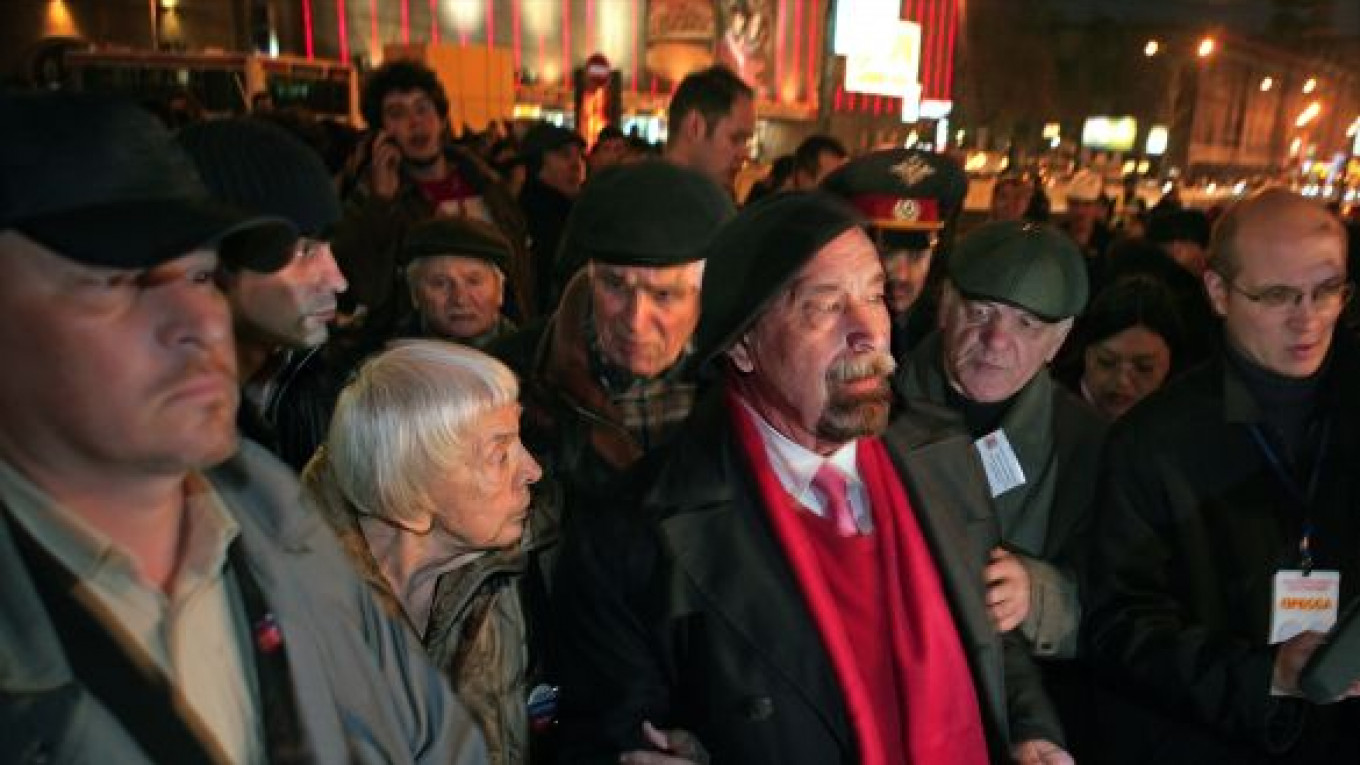No major disruptions spoiled the first authorized opposition rally attended by at least 800 protesters on Triumfalnaya Ploshchad on Sunday evening, but riot police suppressed all attempts to take their protest outside the designated venue.
Dozens of protesters tried to prolong their anti-Kremlin protests as they left the square, unfurling banners on Sadovaya Ulitsa and Tverskaya Ulitsa, but were stopped by riot police. At one point, a group of police officers chased after activists on Tverskaya, blocking street traffic.
The rally attracted at least 800, and possibly up to 1,000 to 1,500 activists, according to the estimate of a Moscow Times reporter. Ekho Moskvy and Gazeta.ru each put the figure at 1,000.
City authorities signed off on the rally last Monday on the condition that the number of participants was restricted to 800. The opposition had wanted 1,500 people. Police said 800 activists and 400 journalists showed up, RIA-Novosti reported.
About 200 supporters of opposition leader Eduard Limonov refused to participate in the authorized event because of the attendance limit and tried to stage a separate rally.
Limonov's supporters lit flares, chanted slogans including “Russia without Putin,” “This is our city” and simply “Freedom,” and used power tools to try to dismantle a fence around a construction site on part of the square.
But riot police roughly pushed them into the venue for the sanctioned rally, not sparing journalists caught in the tussle, including a Moscow Times reporter. Only about 10 people, mostly those with flares, were detained, Ekho Moskvy said. A police official later told Interfax that some of the 30 people who marched toward Barrikadnaya metro station were also detained.
The sanctioned rally concluded without major disruptions. Among the speakers were leading environmentalist Yevgenia Chirikova, rights activist Lev Ponomaryov, liberal politician Boris Nemtsov and other leaders of the Solidarity movement, including Ilya Yashin.
“For the first time we are squaring our shoulders as we speak about things that we deem important,” Yashin said in his speech at the rally. “Those who were recently arresting us must now listen to our slogans.”
Pro-Kremlin youth movements staged a blood drive on the downtown square on Sunday morning, but the event — which has often been used by City Hall as a pretext to ban the opposition¹s attempt to rally at the same venue — did not clash with the evening rally.
The opposition has tries to stage rallies on Triumfalnaya Ploshchad and in other cities across the country on the 31st of every month since 2009 to call attention to Article 31 of the Constitution, which guarantees freedom of assembly.
No rally was every sanctioned by City Hall under Mayor Yury Luzhkov, but his successor, Sergei Sobyanin, appointed in mid-October, changed the policy on condition that no more than 800 people gather.
The condition caused a split among the rally's co-organizers, with Limonov accusing rights veteran Lyudmila Alexeyeva, who agreed to the limit, of “betrayal.”
Alexeyeva along with rights champions Ponomaryov and Oleg Orlov appealed to Limonov last week to join the sanctioned rally, but to no avail.
Alexeyeva, 83, attended Sunday's rally. Alexeyeva vowed not to attend any more of the rallies after police broke up the previous rally on Aug. 31 following a refusal by Luzhkov's City Hall to authorize it. She cited her age and frail health for her decision.
Police treated Alexeyeva roughly at an attempt to hold a similar rally on Dec. 31, sparking international condemnation.
Meanwhile, several people, mostly Limonov supporters, were detained in St. Petersburg on Sunday for trying to stage a similar rally on downtown Nevsky Prospekt. The rally, unlike in Moscow, was not authorized by city authorities.
A Message from The Moscow Times:
Dear readers,
We are facing unprecedented challenges. Russia's Prosecutor General's Office has designated The Moscow Times as an "undesirable" organization, criminalizing our work and putting our staff at risk of prosecution. This follows our earlier unjust labeling as a "foreign agent."
These actions are direct attempts to silence independent journalism in Russia. The authorities claim our work "discredits the decisions of the Russian leadership." We see things differently: we strive to provide accurate, unbiased reporting on Russia.
We, the journalists of The Moscow Times, refuse to be silenced. But to continue our work, we need your help.
Your support, no matter how small, makes a world of difference. If you can, please support us monthly starting from just $2. It's quick to set up, and every contribution makes a significant impact.
By supporting The Moscow Times, you're defending open, independent journalism in the face of repression. Thank you for standing with us.
Remind me later.






